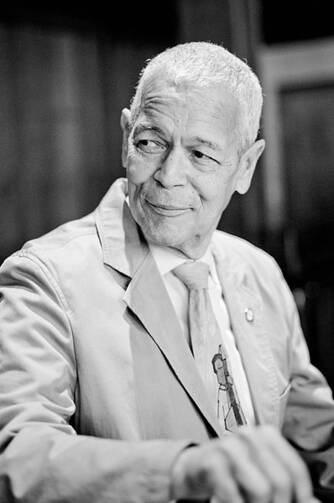Editor's Note: The following is a review of several books, including 'Julian Bond: Black Rebel,' posted to mark Mr. Bond's passing on August 16. The author also reviewed 'Free At Last: The Life of Frederick Douglass' and 'Born to Rebel.'
Although Frederick Douglass, Benjamin Mays and Julian Bond come from different backgrounds and belong to different eras, they share a common dream: to be looked upon one day first as a human being and incidentally as a black man. Neither Douglass, Mays nor Bond are “race” men in the traditional sense; theirs is a commitment to humanity, and they are as attractive in their humanity as they are impressive in their public stature.
The public stature of Frederick Douglass—both in his era and ours—is monumental. His “Fourth of July Oration” and autobiography rank among the finest literature yet produced by a black American, and his numerous articles in the North Star are an unparalleled chronicle of the hopes and frustrations of the abolition movement.
Above all else, Douglass was an intellectual. Yet it is this most important dimension of Douglass' character which Arna Bontemps ignores in Freeat Last. Purporting to be a biography of Douglass, Free at Last reads more like a novel. Emphasized throughout are the protagonist's secret musings, the author's narrative omniscience and the mood of each scene. Nowhere is there probing analysis, historical perspective or sophisticated scholarship. We read much—real or imagined—in Free at Last of Frederick Douglass the man of anger, passion and resentment; but we see little of Frederick Douglass the thinker, the writer, the political strategist. Douglass was all of these things, and because Bontemps portrays only Douglass' more “salable” characteristics, his book must be judged at best incomplete, and at worst deceitful.
In contrast to the Douglass biography, Benjamin Mays' autobiography Born to Rebel is an honest, absorbing work. Dr. Mays—the President for 27 years of Atlanta’s Morehouse College—is a scholar blessed with an inquiring mind and an indomitable spirit. Throughout his life, because he is black, Dr. Mays has been subjected to physical danger and personal abuse. Only a man of great pride and determination could have remained nonviolent in the face of such provocation. But non-violent he remains, and his courage and overwhelming dignity have exasperated and humbled his white antagonists.
While Benjamin Mays was President of Morehouse, Julian Bond, then a student there, helped organize Atlanta's sit-ins for public accommodation. Bond’s efforts in this cause—and numerous others—are chronicled in John Neary’s Julian Bond: BlackRebel, a highly personal, yet still objective account of Georgia's glamorous black politician/poet/folk hero.
Dissecting Bond’s multifaceted personality, Neary captures its basic essence; pragmatism. This pragmatism is best exemplified in Bond’s political dealings with his fellow Georgia legislators. Because his name is anathema to the white legislators, Bond voluntarily muzzles himself and encourages other, less controversial representatives to introduce the needed bills. This way, Bond reasons, important legislation will not be voted down just because it was introduced by “that n—.”
But Bond is also flexible; where the climate permits more, he gives more. In the North and on college campuses Bond is a bold exponent of a total change in American society. But at home, in Georgia, he is a realist. Bond knows his enemies; he understands that pushing too hard will only cause the now-contained, but always bubbling, caldron of white Southern violence to boil over.
Douglass, Mays and Bond have all been called “rebels.” But are they? Douglass, after all, never manned a barricade, and Mays spent most of his life in the Urban League, NAACP and black universities. Even Bond has displayed a contemplative rather than an activist bent. Thus, none of the three men is a “rebel” in the mold of Huey Newton or Eldridge Cleaver. But there are other types of rebels: rebels against complacency, corrupt tradition, lethargy and hopelesseness.
Douglass, Mays and Bond each achieved outstanding personal success and inspired others. Each of the three men served in the government—a white, racist government—but in doing so made it less white, less racist and more tolerant. Each of these men has taken a step, a step toward freedom. The steps have been slow and the journey difficult but, hopefully, the destination is now within reach, and with it the fulfillment of the three men's dream: freedom at last.








